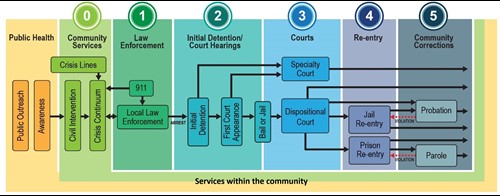SIM Mapping Workshop (OLD)
Apply to host a Youth SIM Mapping Workshop in 2025!
Is your community interested in identifying local behavioral health resources, supporting appropriate diversion from the juvenile justice system, increasing communication across youth-serving systems, and action planning to improve systems? JCMH is now accepting applications for Youth SIM Mapping workshops to be held in 2025.

Sequential Intercept Model (SIM)
The Sequential Intercept Model (SIM) has been used as a focal point for states and communities to assess available resources, determine gaps in services, and plan for community change. These activities are best accomplished by a team of stakeholders that cross over multiple systems, including mental health, substance abuse, law enforcement, pretrial services, courts, jails, community corrections, housing, health, social services, peers, family members, and many others.

Sequential Intercept Mapping Workshops
A Sequential Intercept Mapping is a workshop to develop a map that illustrates how people with behavioral health needs come into contact with and flow through the criminal justice system. Through the workshop, facilitators and participants identify opportunities for linkage to services and for prevention of further penetration into the criminal justice system. These workshops are based on the Sequential Intercept Model developed through SAMHSA’s GAINS Center at Policy Research Associates (PRA).
JCMH partners with HHSC’s Texas Behavioral Health and Justice Technical Assistance (T.A. Center) and other agencies to provide SIM mapping workshops for communities. Generally, SIM Mapping workshops have three primary objectives:
- Development of a comprehensive picture of how people with mental illness and co-occurring disorders flow through the criminal justice system along six distinct intercept points: (0) Mobile Crisis Outreach Teams/Co-Response, (1) Law Enforcement and Emergency Services, (2) Initial Detention and Initial Court Hearings, (3) Jails and Courts, (4) Re-entry, and (5) Community Corrections/Community Support.
- Identification of gaps, resources, and opportunities at each intercept for individuals in the target population.
- Development of priorities for activities designed to improve system and service level response for individuals in the target population.
JCMH Workshop Focus
The JCMH team utilizes the Sequential Intercept Model (SIM) concepts and strategies to conduct a deeper dive into the best practices for addressing mental health needs along the SIM in relation to intercepts directly related to the Texas courts. These intercepts are generally highly concentrated on Intercepts 2 and 3 of the Sequential Intercept Model, focusing on the periods between post-arrest and pre-adjudication, but can include pre-arrest and post-adjudication diversion opportunity points, as well.
Our workshop is designed to tap into community expertise to illustrate how individuals with mental health, behavioral health, and/or substance abuse needs flow through their local criminal justice system by bringing together local partners, including: judges, county leaders, prosecutors and defense attorneys, mental and behavioral health service providers, and other key stakeholders.
Our workshops identify opportunities and resources for diverting people into treatment, indicate gaps in services, and focuses on streamlining processes and procedures.
Following the workshop, our team provides a tailored report summarizing the event, which can be used to develop an action plan in response to specific challenges that the courts face. The report can also be used to shape the Technical Assistance provided to the court and legal community following the workshop.
Upcoming SIM Mapping Workshops
| MONTH/YEAR | COUNTY | AGENCY LEAD |
| June 2024 | Smith Youth | JCMH |
| September 2024 | Grayson Youth | JCMH |
| TBD | Cameron Youth | JCMH |

